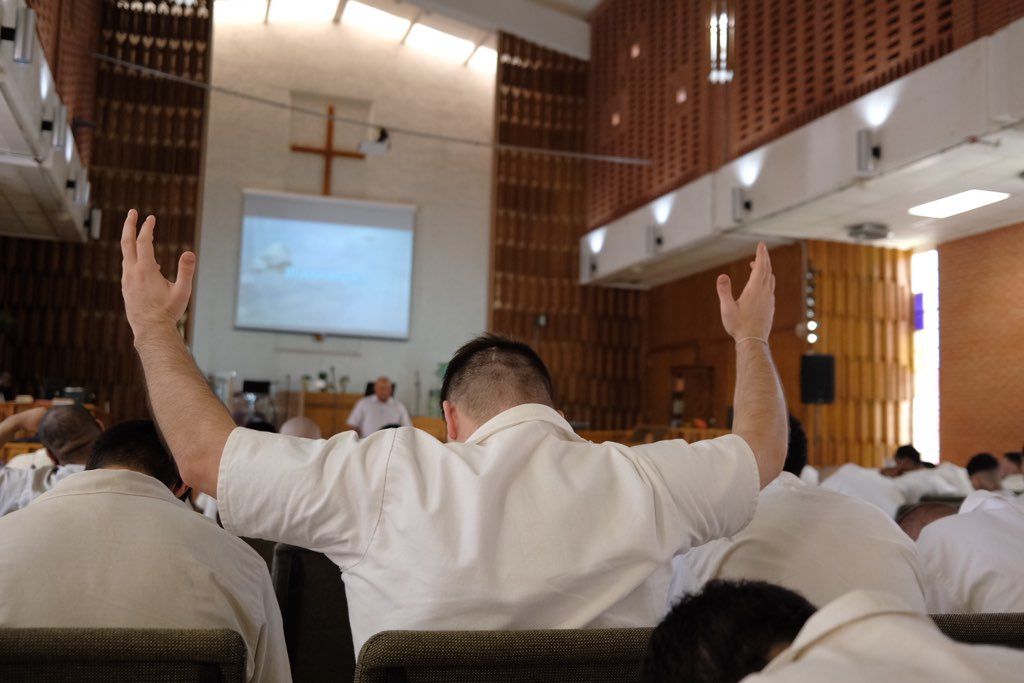Should we educate those in prison?
Prison education programs lower recidivism rates and increase employment opportunities post-release.
“Prison education programs lower recidivism rates and increase employment opportunities post-release,” says Sarah Wood, author of a 2022 article in U.S. News and World Report. Postsecondary education programs come in a variety of forms, ranging from non-credit workshops taught by volunteers to full degree-granting programs. One program called TUMI, short for The Urban Ministry Institute, offered by World Impact, offers a four-year seminary level education intended to equip men and women for service in the ministry field who might not otherwise be able to afford a seminary degree. It was during my research interviewing incarcerated men and women who were students in the program that I learned how much of an impact prison education can make.
The killing trial
In 1993, at a noted after-dark meeting place for homosexuals in East Texas, a group of three men, one aged 29, the “ringleader,” and two others, aged 19 and 17, abducted a 23-year-old man named Nicholas West from the park and drove him down a rural road in their pickup. After forcing West to remove his clothes, and several minutes of untold torture, the three men shot West to death. West was abducted from a park in Tyler, Texas, taken to a gravel pit outside of town, shot nine times, and left to die (UPI, 2003). The three were arrested shortly after the incident, and they were sentenced to life in prison.
Donald Aldrich, the so called “ringleader” was executed in 2004 for “the abduction and gay-bashing murder of an East Texas man,” according to a 2004 Houston Chronicle article, and accomplice Henry Dunn was put to death in February, 2003. The third member, David McMillan, was convicted of aggravated kidnapping and aggravated robbery and received a life prison term.
I met David McMillan, one of the three, who was 17 at the time of the crime and now well into his 29th year of a life sentence, during a group interview as part of my research into the effectiveness of a theological training program in prison in which McMillan was a student.
At the time of the three-hour group interview and casual interactions afterwards with this group of men, most of whom were serving life sentences for various crimes, I had no idea why any of the men were currently imprisoned. It was only later, when our videographer/photographer Jay Keywood shared with me a 2014 Vanity Fair article about McMillan and his partners in crime, did I learn of the gruesome details of McMillan’s story.
Breaking the cycle of recidivism
The 2014 Vanity Fair article portrayed McMillian and his partners as cold-blooded killers, and it was no doubt an accurate description of the young man who began his prison sentence at the age of 17. The man I met, 29 years into his sentence and eligible for a parole hearing in nine months, was nowhere near the same person who entered prison 29 years ago.
Visiting three prisons in the Houston, Texas area, a part of the Texas Department of Criminal Justice, I was there to engage in research asking this group of men what they thought of TUMI and how it has impacted them. TUMI was originally established by World Impact in the 1990s as theological training for pastors in communities of poverty, and 15 years ago, the Prison Ministry program was added in, where church partners function as TUMI satellites to implement the curriculum in correctional settings. Epiphany Life Change, headed by Charles Anderson, was the partner who helped our research team gain access to the Texas prisons for our interviews and videography.
Inside prison walls, the TUMI program, which is voluntary, attempts to prepare incarcerated individuals for faith-based employment, community service, and family and social relationships through educational, values-based, Biblically centered programming (World Impact, 2021). TUMI satellite operations first began in the Kansas prison system, and they now operate in 68 correctional facilities in nine states across the U.S. with 9 partners, serving 902 incarcerated men and women (with 699 cumulative graduates). TUMI was recognized as an official program by the U.S. Federal Bureau of Prisons in 2015 (World Impact, 2021). Participants proceed through the 16 modules, each of which comes with a student workbook, required supplemental textbooks, and four hours of video (two DVDs). Typically, inmates complete the entire program in four years.
I was there for both quantitative and qualitative research. In response to one open-ended question, "Tell us about the kind of person you were before going to prison and who you are now that you have been a part of the TUMI prison training," participants credited TUMI for strengthening and deepening their faith. They said, “My incarceration led me back to the Lord and TUMI played a huge part in strengthening and deepening my faith and in preparing me to succeed upon release.”
Other participants indicated how their lives had changed with statements such as, "I used to be a speed addict alcoholic wife-beater. Now I’m a worship leader message ministering man of God—Amen!" One participant said, "I was immature, frozen by insecurities, and had no faith in anything when I went to prison. God, through TUMI, the church, and others He placed in my path, gave me a new identity."
Another participant reflected, "I had absolutely destroyed my life and the lives of my loved ones. TUMI guided me on a path to examining my behavior and lining it up with Jesus."
Finally, through the curriculum, participants indicated they had "grown and matured as a Christ-centered man and learned my gifting and calling," and "It’s like night and day. I am now much more disciplined in everything I do." Another reflected on how TUMI changed his self-perspective, stating, "I didn’t think I had the abilities or the confidence to complete a college course, let alone an entire 4-year program."
Like talking with life-long friends
It struck me, as I interviewed these men, that it was like having a conversation with a group of long-time friends. I was that comfortable being with them.
Participants reflected that before TUMI, they had poor quality family relationships and associations with peers who were also involved in criminal activity.
A big component of the TUMI program, which goes beyond the typical correspondence courses that are highly available in prison, is the relationships that are formed during class interactions and beyond. "It’s the community, the relationships, the camaraderie. These guys right here in this room (referring to the TUMI participants around the table), this is my family, and I love them very much!" Another said, "It’s a beautiful thing, this friendship, this bond we have with one another."
McMillan, in particular, shared how being a part of TUMI “gives a man hope.” He said, “You have to give the people hope. Because if people have no hope, then it’s ‘get up in the morning and have no kind of guidance.’ They look up to the toughest dudes and try to imitate them. But when you have people like the men in this classroom, who are walking and shedding light everywhere they go, then they have something positive to follow. There’s a better way to live, and it’s like this.”
He added that, “you gotta rehabilitate yourself. We’re gonna be in this program, and we got to set the example and break the cycle and break the chains.” TUMI breaks the cycle; “It gives a man hope,” he said.
Not the same man
McMillan also talked about the fears he had about being released and returning to the community after 30 years in prison. Would he be able to pick out toothpaste from the rows and rows of options available at the local drug store (options at the prison “store” were limited to two)? Would he over-react one night if his future wife went to touch him tenderly in the night (if someone touches you in prison while you’re sleeping, it’s definitely not a good thing)? Would he panic at the DMV while getting his identification in order (when a lot of people are milling about near you in prison, it’s also not a good thing, and you must keep your guard up at all times, fully prepared to defend yourself)?
With someone who possessed this level of self-awareness and thoughtfulness, I wondered…was I sitting two feet away from the same man in the article? Most certainly, I was not.
Should we educate prisoners?
"The benefits of educating prisoners are numerous. For example, education can aid prisoners’ personal development and improve their sense of well-being, thereby contributing to an improved prison environment for prisoners and staff alike. In addition, it can help to reduce the financial cost of re-offending and the number of victims of crime, thus helping prisoners with their successful re-integration back into society” (Klementowski, 2020).
I believe the evidence is clear: TUMI is responsible for the drastic change I observed in people like David McMillan. So, yes, we should educate prisoners!
Ready to learn about how program evaluation can maximize your organization’s community impact? From data collection, to analysis, to communicating findings to a wide audience, we develop insights that drive informed decisions. Get started by emailing robin@labarberalearning.com.
References
Bissinger, B. (2014). The killing trial. Vanity Fair. Retrieved from https://www.vanityfair.com/news/1995/02/texas-murder-199502
Epiphany Life Change. https://www.epiphanylifechange.org/
Klementowski, S.A. (2020). Should we educate prisoners? Open Learn (on Medium). Retrieved from https://openlearn.medium.com/should-we-educate-prisoners-1b6465ae7388
Houston Chronicle. (2004, Oct. 13). Second man executed for gay-bashing murder. Retrieved from https://www.chron.com/news/houston-texas/article/Second-man-executed-for-gay-bashing-murder-1962403.php
UPI. (2003, Feb. 6). Killer in gay-bashing murder executed. Retrieved from https://www.upi.com/Top_News/2003/02/06/Killer-in-gay-bashing-murder-executed/83291044581381/#:~:text=Dunn%2C%20Donald%20Aldrich%20and%20David,to%20die%2C%20according%20to%20prosecutors.
Wood, S. (2022, Mar. 8). Prison education programs: What to know. U.S. News and World Report. Retrieved from https://www.usnews.com/education/articles/prison-education-programs-what-to-know
World Impact. (2021). Prison ministry. https://worldimpact.org/programs/prison-ministry.










